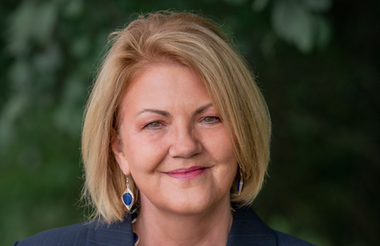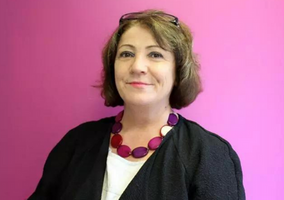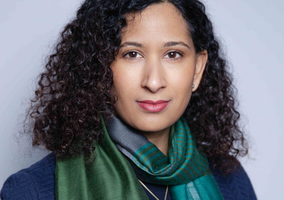Diane Cooper has been chief executive at the Scottish Women's Institutes (SWI) for almost a year, and plans are already underway at the charity to tackle misperceptions and help the organisation attract new members, while retaining those who are already at the charity.
Cooper has a creative background, having been to art college, and is one of five sisters. These were both factors that led her to the SWI, where she “wanted to encourage that feeling of all women experiencing sisterhood”.
The five sisters had their “own little Institute” growing up, so being “surrounded by women” was something that appealed to Cooper, who “understands what it's all about” at the SWI.
Before joining the charity, Cooper had also worked in senior roles in membership organisations, so had a good conception of the perks and challenges. She aims to make the SWI inclusive for all women in Scotland, which was probably the “ultimate reason” she applied.
Though it has been an exciting first year at the helm, Cooper says “it's quite scary as well” as it is “a huge role with loads of challenges, but immense opportunities”.
‘There are misconceptions’
Cooper says the perception that the SWI is just about “jam, baking, scones” is not the full picture. Though members have a range of craft-based skills – Cooper explains “it's evolved over time” – they also do activities such as wild swimming, as well as health and wellbeing sessions.
The latter, Cooper says, is attracting more members as it is “of interest to all women, regardless of what age they are”. In these events, the charity runs expert sessions with people on topics such as the menopause, dementia and caring.
So though there are misconceptions, “there's an element of it that has evolved over time to provide 21st century-type activities for women”, she says.
“I'd like it to be a confident, modern organisation, that women feel as though they could come and join. I want to make it attractive to women of the 21st century.”
She says in historical organisations such as the SWI “it takes a long, long time to change perceptions” and it “is not going to happen overnight… But I think we can start on this journey”.
“We want to make sure that we are uniquely positioned in Scotland to provide and inspire women from any community.”
As part of its refreshed identity, Cooper says she is keen to work with other organisations who have done work on campaigning.
She stressed that this would not be “piggybacking” on other charities’ campaigned but working in partnership with them. “I'm keen to start on that level, and then see how it evolves”, she says.
“I would not say that the SWI has really been a campaigning organisation. It may have been in the early days, but to be honest, it is not just now. It is something that the board has asked to revisit - and we will have that as part of the strategy going forward.”
Changing the constitution
The SWI has 10,000 members in Scotland, 500 institutes and 29 federations.
“We are going to be changing the constitution, because we have so many layers of governance, historic layers of governance, and a lot of formality that in this day and age isn't necessarily needed.”
“I want to make sure that we have a constitution that's a wee bit more flexible – that allows you to evolve and change as time goes on,” explains Cooper.
They are looking to move to the Scottish Charitable Incorporated Organisation (SCIO) model as “what that does is provide us with an opportunity to streamline things”.
In December the board is going to be presented with new models. “What does it involve? What does it mean for the membership? What's the benefits? What's the pros and cons of going forward, and the members will be consulted through all that process as well,” she says.
New income streams
Cooper says a consultation with members showed that around 94% acknowledged the need for change, as they “know that we need to change and adapt for the 21st century women”.
“If we were not to change, we would not survive. That's an important part of the overall strategy as well as new income generation, modernising our services, and bringing new members, diversifying, and being more inclusive of women in Scotland.”
Indeed, the charity is launching a three-year plan with “an overarching theme of making sure that the SWI preserve the past and involve members in shaping the future”.
Cooper says “growth is not all about creating new groups, the growth is all about existing groups, about refreshing themselves” and members are leading this. “It's all about existing groups and regenerating them for the future,” she says.
She notes that membership organisations normally have multiple income streams to be able to survive “but we have one income stream at the moment, and that is membership fees”.
SWI events do not currently bring in much income, so as part of Cooper’s vision the charity plans to develop a visitor learning centre in Scotland. This would educate visitors on the charity’s 105-year history, and would likely include a shop and a cafe.
“There'll be a digital element to that as well, because digital transformation is really important to me.”
Impact of Covid-19
“The majority of our members join us because of friendship” and Covid-19 put more of an importance on that to a certain extent, says Cooper.
Before the pandemic the membership was in “gradual decline” as there wasn't a succession of new members coming in “so they were relying on existing members to maintain that status”.
The pandemic came “like a storm battering a tree and all the leaves started to fall off quickly”, she says, making many members isolated.
Just over half of the charity’s members had digital access, with many in rural locations unable to get online, meaning “particular members had it tough”.
The charity “transitioned online” but Cooper says it is “heart-warming” to see members back together.
Cooper says “there is still a fallout from Covid-19” as the SWI lost about 49 of its 500 institutes – a “big chunk”.
As the charity moves into the cost-of-living crisis, Cooper says it is putting things in place so that the members can support each other. The SWI is also looking externally, and talking to a large national charity, so that members can go and help younger women, or women who are more vulnerable.
She explains SWI have got the internal membership supporting each other and also an external view of what members can socially contribute.
Membership ‘an ongoing journey’
“I would say about 60% of our members are between 45 and 70. So there's that intergenerational work that could be happening.”
Part of Cooper’s vision is for members to pass on their skills to future generations.
The charity has been piloting new groups, rather than institutes, to use as case studies. Cooper says she has noticed a new “momentum” where women want to be with other women for friendship, for learning, and for fun – “that's what we're all about”.
The SWI is specifically targeting places where there is under-representation of its members, including Glasgow.
Cooper says it is “an ongoing journey, because we're having to play catch up to be seen as an inclusive and diverse organisation that is open to all women and girls in Scotland”.
“We're certainly making inroads”, but Cooper says there is more to be done. For example, SWI are engaging with organisations who have to reach out to specific communities, such as Ukrainians moving to Scotland.
Related Articles
Annwen Jones: ‘I did feel in that worst case scenario the charity would not survive’
The co-founder and chief executive of Target Ovarian Cancer speaks about the impact of the pandemic and cost-of-living crisis on the charity, the importance of campaigning and the health inequity women experience.
Ian Green: ‘It’s been the privilege of my life to lead the Terrence Higgins Trust’
The HIV charity’s outgoing CEO discusses his own diagnosis, experience of conversion therapy and challenges he has faced in the role
Farah Nazeer: ‘Charities need the courage of their convictions to speak out’
Farah Nazeer, chief executive at Women's Aid, speaks to Harriet Whitehead about how the charity is campaigning to challenge misogynistic culture and end domestic abuse












